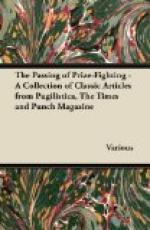[Illustration]
* * * * *
MICHAELMAS DAY
Every one knows that about this time of the year geese are in their prime, and are particularly good when stuffed with sage; which accounts for the fact, that Sibthorp has made some sage remarks, so that he may not lose by comparison with the “foolish birds,” with whom he feels a natural sympathy.
We have never been able to discover the connexion between geese and Michaelmas. There is a reason for associating ducks with Midsummer: we can understand the meaning of poultry at Christmas, for birds are appropriate to a period when every one sends in his bill; but why poor St. Michael should be so degradingly associated with a goose is beyond our comprehension, and baffles our ingenuity. If St. Michael had been a tailor, or an actor, or an author, we could have understood how goose might have applied to him; but as he was neither one nor the other, we really are at a loss to conceive why a goose should have become so intimately associated with his name and character.
Among other curious incidents, it may be remarked that, with an instinctive dread of goose, the redoubtable Martinuzzi drew in his horns, just on the eve of Michaelmas, and the Syncretics have just shut up shop in time to avoid the “compliments of the season” that they had every right and every reason to anticipate would be bestowed, if not with a “liberal hand,” at least with “a lavish mouth,” by their audience.
It must be remembered by all the geese against whom PUNCH thinks proper to indulge his wit, that at this season of the year they must expect to be roasted. Upon the whole, however, we have a high respect for “the foolish bird,” and when it is remembered that the geese saved Rome, we do not think we are wrong in suggesting the possibility of England being yet saved by Lord Coventry, or any other cackler in either house of Parliament.
* * * * *
“LAND SHARKS AND SEA GULLS.”




